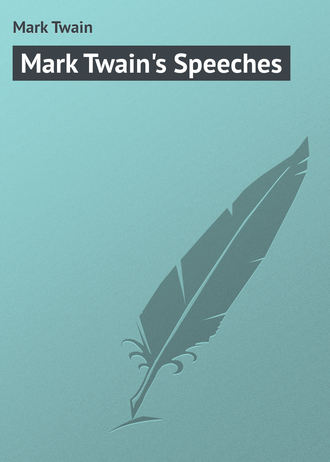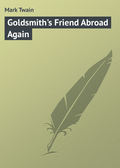
Марк Твен
Mark Twain's Speeches
Fulton Day, Jamestown
Address delivered September 23, 1907.
Lieutenant-Governor Ellyson, of Virginia, in introducing Mr. Clemens, said:
“The people have come here to bring a tribute of affectionate recollection for the man who has contributed so much to the progress of the world and the happiness of mankind.” As Mr. Clemens came down to the platform the applause became louder and louder, until Mr. Clemens held out his hand for silence. It was a great triumph, and it was almost a minute after the applause ceased before Mr. Clemens could speak. He attempted it once, and when the audience noticed his emotion, it cheered again loudly.
Ladies and gentlemen, – I am but human, and when you, give me a reception like that I am obliged to wait a little while I get my voice. When you appeal to my head, I don’t feel it; but when you appeal to my heart, I do feel it.
We are here to celebrate one of the greatest events of American history, and not only in American history, but in the world’s history.
Indeed it was – the application of steam by Robert Fulton.
It was a world event – there are not many of them. It is peculiarly an American event, that is true, but the influence was very broad in effect. We should regard this day as a very great American holiday. We have not many that are exclusively American holidays. We have the Fourth of July, which we regard as an American holiday, but it is nothing of the kind. I am waiting for a dissenting voice. All great efforts that led up to the Fourth of July were made, not by Americans, but by English residents of America, subjects of the King of England.
They fought all the fighting that was done, they shed and spilt all the blood that was spilt, in securing to us the invaluable liberties which are incorporated in the Declaration of Independence; but they were not Americans. They signed the Declaration of Independence; no American’s name is signed to that document at all. There never was an American such as you and I are until after the Revolution, when it had all been fought out and liberty secured, after the adoption of the Constitution, and the recognition of the Independence of America by all powers.
While we revere the Fourth of July – and let us always revere it, and the liberties it conferred upon us – yet it was not an American event, a great American day.
It was an American who applied that steam successfully. There are not a great many world events, and we have our full share. The telegraph, telephone, and the application of steam to navigation – these are great American events.
To-day I have been requested, or I have requested myself, not to confine myself to furnishing you with information, but to remind you of things, and to introduce one of the nation’s celebrants.
Admiral Harrington here is going to tell you all that I have left untold. I am going to tell you all that I know, and then he will follow up with such rags and remnants as he can find, and tell you what he knows.
No doubt you have heard a great deal about Robert Fulton and the influences that have grown from his invention, but the little steamboat is suffering neglect.
You probably do not know a great deal about that boat. It was the most important steamboat in the world. I was there and saw it. Admiral Harrington was there at the time. It need not surprise you, for he is not as old as he looks. That little boat was interesting in every way. The size of it. The boat was one [consults Admiral], he said ten feet long. The breadth of that boat [consults Admiral], two hundred feet. You see, the first and most important detail is the length, then the breadth, and then the depth; the depth of that boat was [consults again] – the Admiral says it was a flat boat. Then her tonnage – you know nothing about a boat until you know two more things: her speed and her tonnage. We know the speed she made. She made four miles – and sometimes five miles. It was on her initial trip, on, August 11, 1807, that she made her initial trip, when she went from [consults Admiral] Jersey City – to Chicago. That’s right. She went by way of Albany. Now comes the tonnage of that boat. Tonnage of a boat means the amount of displacement; displacement means the amount of water a vessel can shove in a day. The tonnage of man is estimated by the amount of whiskey he can displace in a day.
Robert Fulton named the ‘Clermont’ in honor of his bride, that is, Clermont was the name of the county-seat.
I feel that it surprises you that I know so much. In my remarks of welcome of Admiral Harrington I am not going to give him compliments. Compliments always embarrass a man. You do not know anything to say. It does not inspire you with words. There is nothing you can say in answer to a compliment. I have been complimented myself a great many times, and they always embarrass me – I always feel that they have not said enough.
The Admiral and myself have held public office, and were associated together a great deal a friendly way in the time of Pocahontas. That incident where Pocahontas saves the life of Smith from her father, Powhatan’s club, was gotten up by the Admiral and myself to advertise Jamestown.
At that time the Admiral and myself did not have the facilities of advertising that you have.
I have known Admiral Harrington in all kinds of situations – in public service, on the platform, and in the chain-gang now and then – but it was a mistake. A case of mistaken identity. I do not think it is at all a necessity to tell you Admiral Harrington’s public history. You know that it is in the histories. I am not here to tell you anything about his public life, but to expose his private life.
I am something of a poet. When the great poet laureate, Tennyson, died, and I found that the place was open, I tried to get it – but I did not get it. Anybody can write the first line of a poem, but it is a very difficult task to make the second line rhyme with the first. When I was down in Australia there were two towns named Johnswood and Par-am. I made this rhyme:
“The people of Johnswood are pious and good;
The people of Par-am they don’t care a—.”
I do not want to compliment Admiral Harrington, but as long as such men as he devote their lives to the public service the credit of the country will never cease. I will say that the same high qualities, the same moral and intellectual attainments, the same graciousness of manner, of conduct, of observation, and expression have caused Admiral Harrington to be mistaken for me – and I have been mistaken for him.
A mutual compliment can go no further, and I now have the honor and privilege of introducing to you Admiral Harrington.
Lotos Club Dinner In Honor Of Mark Twain
Address at the first formal dinner in the new club-house, November 11, 1893.
In introducing the guest of the evening, Mr. Lawrence said:
“To-night the old faces appear once more amid new surroundings. The place where last we met about the table has vanished, and to-night we have our first Lotos dinner in a home that is all our own. It is peculiarly fitting that the board should now be spread in honor of one who has been a member of the club for full a score of years, and it is a happy augury for the future that our fellow-member whom we assemble to greet should be the bearer of a most distinguished name in the world of letters; for the Lotos Club is ever at its best when paying homage to genius in literature or in art. Is there a civilized being who has not heard the name of Mark Twain? We knew him long years ago, before he came out of the boundless West, brimful of wit and eloquence, with no reverence for anything, and went abroad to educate the untutored European in the subtleties of the American joke. The world has looked on and applauded while he has broken many images. He has led us in imagination all over the globe. With him as our guide we have traversed alike the Mississippi and the Sea of Galilee. At his bidding we have laughed at a thousand absurdities. By a laborious process of reasoning he has convinced us that the Egyptian mummies are actually dead. He has held us spellbound upon the plain at the foot of the great Sphinx, and we have joined him in weeping bitter tears at the tomb of Adam. To-night we greet him in the flesh. What name is there in literature that can be likened to his? Perhaps some of the distinguished gentlemen about this table can tell us, but I know of none. Himself his only parallel!”
Mr. President, gentlemen, and my fellow-members of the lotos club, – I have seldom in my lifetime listened to compliments so felicitously phrased or so well deserved. I return thanks for them from a full heart and an appreciative spirit, and I will say this in self-defence: While I am charged with having no reverence for anything, I wish to say that I have reverence for the man who can utter such truths, and I also have a deep reverence and a sincere one for a club that can do such justice to me. To be the chief guest of such a club is something to be envied, and if I read your countenances rightly I am envied. I am glad to see this club in such palatial quarters. I remember it twenty years ago when it was housed in a stable.
Now when I was studying for the ministry there were two or three things that struck my attention particularly. At the first banquet mentioned in history that other prodigal son who came back from his travels was invited to stand up and have his say. They were all there, his brethren, David and Goliath, and – er, and if he had had such experience as I have had he would have waited until those other people got through talking. He got up and testified to all his failings. Now if he had waited before telling all about his riotous living until the others had spoken he might not have given himself away as he did, and I think that I would give myself away if I should go on. I think I’d better wait until the others hand in their testimony; then if it is necessary for me to make an explanation, I will get up and explain, and if I cannot do that, I’ll deny it happened.
Later in the evening Mr. Clemens made another speech, replying to a fire of short speeches by Charles Dudley Warner, Charles A. Dana, Seth Low, General Porter, and many others, each welcoming the guest of honor.
I don’t see that I have a great deal to explain. I got off very well, considering the opportunities that these other fellows had. I don’t see that Mr. Low said anything against me, and neither did Mr. Dana. However, I will say that I never heard so many lies told in one evening as were told by Mr. McKelway – and I consider myself very capable; but even in his case, when he got through, I was gratified by finding how much he hadn’t found out. By accident he missed the very things that I didn’t want to have said, and now, gentlemen, about Americanism.
I have been on the continent of Europe for two and a half years. I have met many Americans there, some sojourning for a short time only, others making protracted stays, and it has been very gratifying to me to find that nearly all preserved their Americanism. I have found they all like to see the Flag fly, and that their hearts rise when they see the Stars and Stripes. I met only one lady who had forgotten the land of her birth and glorified monarchical institutions.
I think it is a great thing to say that in two and a half years I met only one person who had fallen a victim to the shams – I think we may call them shams – of nobilities and of heredities. She was entirely lost in them. After I had listened to her for a long time, I said to her: “At least you must admit that we have one merit. We are not like the Chinese, who refuse to allow their citizens who are tired of the country to leave it. Thank God, we don’t!”
Copyright
With Mr. Howells, Edward Everett Hale, Thomas Nelson Page, and a number of other authors, Mr. Clemens appeared before the committee December 6, 1906. The new Copyright Bill contemplated an author’s copyright for the term of his life and for fifty years thereafter, applying also for the benefit of artists, musicians, and others, but the authors did most of the talking. F. D. Millet made a speech for the artists, and John Philip Sousa for the musicians.
Mr. Clemens was the last speaker of the day, and its chief feature. He made a speech, the serious parts of which created a strong impression, and the humorous parts set the Senators and Representatives in roars of laughter.
I have read this bill. At least I have read such portions as I could understand. Nobody but a practised legislator can read the bill and thoroughly understand it, and I am not a practised legislator.
I am interested particularly and especially in the part of the bill which concerns my trade. I like that extension of copyright life to the author’s life and fifty years afterward. I think that would satisfy any reasonable author, because it would take care of his children. Let the grandchildren take care of themselves. That would take care of my daughters, and after that I am not particular. I shall then have long been out of this struggle, independent of it, indifferent to it.
It isn’t objectionable to me that all the trades and professions in the United States are protected by the bill. I like that. They are all important and worthy, and if we can take care of them under the Copyright law I should like to see it done. I should like to see oyster culture added, and anything else.
I am aware that copyright must have a limit, because that is required by the Constitution of the United States, which sets aside the earlier Constitution, which we call the decalogue. The decalogue says you shall not take away from any man his profit. I don’t like to be obliged to use the harsh term. What the decalogue really says is, “Thou shaft not steal,” but I am trying to use more polite language.
The laws of England and America do take it away, do select but one class, the people who create the literature of the land. They always talk handsomely about the literature of the land, always what a fine, great, monumental thing a great literature is, and in the midst of their enthusiasm they turn around and do what they can to discourage it.
I know we must have a limit, but forty-two years is too much of a limit. I am quite unable to guess why there should be a limit at all to the possession of the product of a man’s labor. There is no limit to real estate.
Doctor Bale has suggested that a man might just as well, after discovering a coal-mine and working it forty-two years, have the Government step in and take it away.
What is the excuse? It is that the author who produced that book has had the profit of it long enough, and therefore the Government takes a profit which does not belong to it and generously gives it to the 88,000,000 of people. But it doesn’t do anything of the kind. It merely takes the author’s property, takes his children’s bread, and gives the publisher double profit. He goes on publishing the book and as many of his confederates as choose to go into the conspiracy do so, and they rear families in affluence.
And they continue the enjoyment of those ill-gotten gains generation after generation forever, for they never die. In a few weeks or months or years I shall be out of it, I hope under a monument. I hope I shall not be entirely forgotten, and I shall subscribe to the monument myself. But I shall not be caring what happens if there are fifty years left of my copyright. My copyright produces annually a good deal more than I can use, but my children can use it. I can get along; I know a lot of trades. But that goes to my daughters, who can’t get along as well as I can because I have carefully raised them as young ladies, who don’t know anything and can’t do anything. I hope Congress will extend to them the charity which they have failed to get from me.
Why, if a man who is not even mad, but only strenuous – strenuous about race-suicide – should come to me and try to get me to use my large political and ecclesiastical influence to get a bill passed by this Congress limiting families to twenty-two children by one mother, I should try to calm him down. I should reason with him. I should say to him, “Leave it alone. Leave it alone and it will take care of itself. Only one couple a year in the United States can reach that limit. If they have reached that limit let them go right on. Let them have all the liberty they want. In restricting that family to twenty-two children you are merely conferring discomfort and unhappiness on one family per year in a nation of 88,000,000, which is not worth while.”
It is the very same with copyright. One author per year produces a book which can outlive the forty-two-year limit; that’s all. This nation can’t produce two authors a year that can do it; the thing is demonstrably impossible. All that the limited copyright can do is to take the bread out of the mouths of the children of that one author per year.
I made an estimate some years ago, when I appeared before a committee of the House of Lords, that we had published in this country since the Declaration of Independence 220,000 books. They have all gone. They had all perished before they were ten years old. It is only one book in 1000 that can outlive the forty-two year limit. Therefore why put a limit at all? You might as well limit the family to twenty-two children.
If you recall the Americans in the nineteenth century who wrote books that lived forty-two years you will have to begin with Cooper; you can follow with Washington Irving, Harriet Beecher Stowe, Edgar Allan Poe, and there you have to wait a long time. You come to Emerson, and you have to stand still and look further. You find Howells and T. B. Aldrich, and then your numbers begin to run pretty thin, and you question if you can name twenty persons in the United States who – in a whole century have written books that would live forty-two years. Why, you could take them all and put them on one bench there [pointing]. Add the wives and children and you could put the result on, two or three more benches.
One hundred persons – that is the little, insignificant crowd whose bread-and-butter is to be taken away for what purpose, for what profit to anybody? You turn these few books into the hands of the pirate and of the legitimate publisher, too, and they get the profit that should have gone to the wife and children.
When I appeared before that committee of the House of Lords the chairman asked me what limit I would propose. I said, “Perpetuity.” I could see some resentment in his manner, and he said the idea was illogical, for the reason that it has long ago been decided that there can be no such thing as property in ideas. I said there was property in ideas before Queen Anne’s time; they had perpetual copyright. He said, “What is a book? A book is just built from base to roof on ideas, and there can be no property in it.”
I said I wished he could mention any kind of property on this planet that had a pecuniary value which was not derived from an idea or ideas.
He said real estate. I put a supposititious case, a dozen Englishmen who travel through South Africa and camp out, and eleven of them see nothing at all; they are mentally blind. But there is one in the party who knows what this harbor means and what the lay of the land means. To him it means that some day a railway will go through here, and there on that harbor a great city will spring up. That is his idea. And he has another idea, which is to go and trade his last bottle of Scotch whiskey and his last horse-blanket to the principal chief of that region and buy a piece of land the size of Pennsylvania.
That was the value of an idea that the day would come when the Cape to Cairo Railway would be built.
Every improvement that is put upon the real estate is the result of an idea in somebody’s head. The skyscraper is another idea; the railroad is another; the telephone and all those things are merely symbols which represent ideas. An andiron, a wash-tub, is the result of an idea that did not exist before.
So if, as that gentleman said, a book does consist solely of ideas, that is the best argument in the world that it is property, and should not be under any limitation at all. We don’t ask for that. Fifty years from now we shall ask for it.
I hope the bill will pass without any deleterious amendments. I do seem to be extraordinarily interested in a whole lot of arts and things that I have got nothing to do with. It is a part of my generous, liberal nature; I can’t help it. I feel the same sort of charity to everybody that was manifested by a gentleman who arrived at home at two o’clock in the morning from the club and was feeling so perfectly satisfied with life, so happy, and so comfortable, and there was his house weaving, weaving, weaving around. He watched his chance, and by and by when the steps got in his neighborhood he made a jump and climbed up and got on the portico.
And the house went on weaving and weaving and weaving, but he watched the door, and when it came around his way he plunged through it. He got to the stairs, and when he went up on all fours the house was so unsteady that he could hardly make his way, but at last he got to the top and raised his foot and put it on the top step. But only the toe hitched on the step, and he rolled down and fetched up on the bottom step, with his arm around the newel-post, and he said:
“God pity the poor sailors out at sea on a night like this.”







